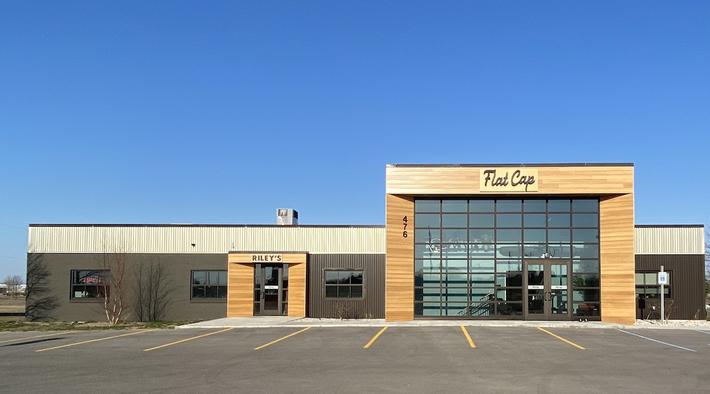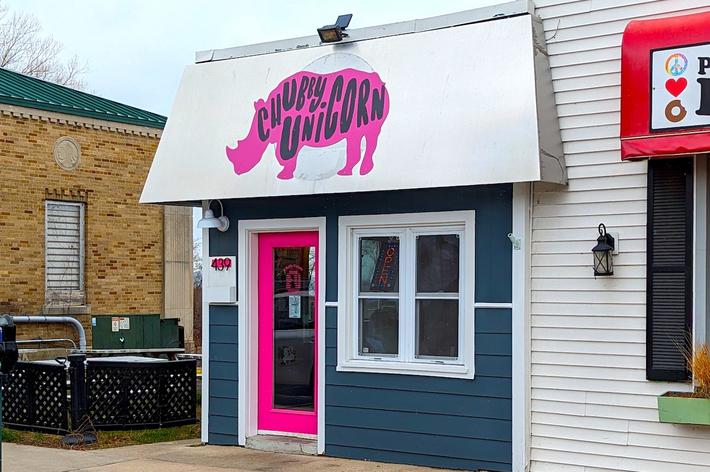
Addiction Isn’t Taking a Break
How people in recovery and addiction support organizations are managing with the lockdown's added obstacles.
By Patrick Sullivan | May 2, 2020
Methadone saved Mariah Pelky’s life but getting the dose that helps the Interlochen resident resist her narcotics addiction requires she drives to a clinic in Gaylord six days each week.
Still, she considers herself to be one of the lucky ones. The methadone and a stable family life have kept her on course despite the pandemic, which has made life especially difficult for people struggling with addiction.
“I know a couple of people that have relapsed. You know, they lose their jobs. Stress. Not knowing where to turn to,” Pelky said. “I have a feeling overdoses are going to skyrocket if things don’t go back to normal soon.”
Though she is several years into recovery, Pelky acutely understands the allure of opiates — and how easy it’d be to slip back into them. Driving to Detroit every now and again to pick up some bulk heroin on the street would be much simpler than driving to Gaylord every day, after all.
“Hypothetically, it would be way easier for me to just go down to Detroit and pick up a brick and just park myself on the couch,” she said.
LACK OF ACCESS TO METHADONE
Pam Lynch, director of Harm Reduction Michigan, agrees with Pelky’s prediction about overdoses increasing amid the pandemic.
“We have seen some overdoses, and we had a client whose partner overdosed fatally last week,” Lynch said. “You know, it’s just a tragedy. From my perspective, our country has really done a really poor job in handling the opiate crisis.”
Harm Reduction, a nonprofit, has offices in Traverse City, Cadillac, Petoskey, and Midland, and they offer access to medically assisted treatment and therapy.
One of the challenges with fighting the opiate epidemic in northern Michigan is the lack of access to methadone. There are only two places in northern Michigan where it is available, and both of those clinics are in Gaylord. The next nearest source is in Mt. Pleasant.
“It’s a pretty ridiculous situation. Methadone should be available in a lot more communities than it is,” Lynch said.
Meanwhile, however, Lynch said Harm Reduction has been able to operate through the pandemic and offer all of the services it offered before the crisis. They’ve cut back their walk-in hours, but each office remains open.
Nonetheless, Lynch said she believes the crisis is causing people to hesitate before reaching out for help with addiction, either because they assume it isn’t available now or because the pandemic has made it harder to do anything.
“There is a tendency [for people dealing with addiction] to be embarrassed and ashamed already. You add COVID on top of that, and it just makes it worse,” Lynch said.
For example, through the Traverse City office, Harm Reduction continues to run a needle-exchange program so that addicts have access to clean and safe needles. Lynch said she realized early on in the crisis that she needed to provide clients with letters stating that needle access is an essential service and that clients could travel for the purpose of visiting a needle exchange. Lynch said she has not heard of clients having problems with police, but she said many clients felt uncomfortable enough driving during the stay-at-home mandate that they wanted such a letter.
“It’s challenging for the people living with addiction to feel comfortable accessing those services,” she said. “Some people don’t understand addiction and think it’s a choice.”
“A REALLY ODD TIME”
In drug court, a diversion program for people who committed crimes that stem from addiction, many of the carrots and sticks typically used to keep people straight are no longer available.
“For all of us, there’s a certain level of stress. Even if you’ve got employment still, it’s just a really odd time,” said 86th District Court Judge Robert Cooney. “For people who are dealing with addiction, this [time] is worse.”
For one thing, upon initiation into drug court, a defendant must find a job and keep it. Most of the folks in drug court have lost their jobs amid the stay-at-home order.
“A lot of them have gained jobs only recently, and then they’ve lost them. Not all of them, but most of them,” Cooney said. “To see that happen is really just sad.”
The court and probation officers have also had to cut back on drug testing. The center where defendants could go for court-ordered drug testing, New Direction, had to shut down.
There are home monitoring units and ankle monitors to test people for alcohol use, but with the testing center closed, those are in short supply and have to be reserved for extreme cases, such as habitual drunk drivers or people who’ve committed violent domestic assaults.
Cooney said he is concerned that they’ve had to cut back too much, but he said, on the other hand, he recognizes that there’s a feeling among some court observers that the court’s monitoring of defendants on bond has traditionally been too severe.
“It definitely concerns me. I tend to err on the side of caution; I want to protect public safety,” he said. “All I can do is say, ‘Please, don’t use alcohol. We can’t test you for it, but if you get caught, you might go to jail.’”
And therein lies another dilemma: Judges right now have to take pains not to throw too many people in jail so that jail populations can maintain social distancing.
In Grand Traverse County, there are typically 140 to 160 people in jail at this time of year. At the end of April, there were just 91, as low a number as Cooney has seen in 26 years.
“Jail is, of course, less of an option right now. I think I can just say that, I don’t think it’s a secret with many if our defendants. We’re trying to limit the number of people in the jail,” he said. “I know the jail is doing everything they can to create space, not have it be so congested. We haven’t had any cases, as far as I know, in our jail, and I hope it stays that way. It’s a very difficult balancing act.”
On the positive side, probation officers now have more time freed up to spend in one-on-one online meetings with drug court attendees. In early May, Cooney said he planned to start holding actual drug court hearings again over Zoom.
A FINANCIAL CRISIS FOR TREATMENT
People who work in addiction treatment agree that when this crisis is over, there are going to be a lot of people needing help.
That could come at a bad time for treatment providers, however, because many of them are struggling to survive right now, said Christopher Hindbaugh, executive director of Addiction Treatment Services.
Take ATS: Unlike some nonprofits, which are funded through grants, the organization is funded primarily through Medicaid fees for specific services, meaning their income is dependent on the volume of people they serve.
When the crisis arrived, addiction treatment centers were deemed essential and mandated to stay open by the state; ATS had to increase staff to meet safety guidelines, Hindbaugh said. But for weeks, while the treatment center was fully staffed it also was virtually vacant because most people who needed help were scared away by the coronavirus.
“For three weeks, we were open and operating at 10-percent capacity because people just didn’t want to show up,” Hindbaugh said. “Our phones were busy. People were calling and saying they were in crisis. But when it came to coming to detox, they just didn’t want to be here.”
Hindbaugh said he closed a couple of programs, like a jail diversion program that was nearly empty, in order to save money.
But at the same time, ATS was suddenly forced to invest in new technology so that workers could work from home and attend video meetings.
It’s amounted to a financial crisis for his organization, and other treatment centers around Michigan are also struggling, he said. Hindbaugh said ATS has applied for funding through the Paycheck Protection Program and hopes to weather the storm with that.
“I’ve talked to three-quarters of the treatment centers around Michigan, and we’re all in the same state,” he said. “It’s kind of its own other crisis.”
Meanwhile, places like ATS may be soon in more demand than ever. Business at ATS is picking up, and Hindbaugh has noticed that many people have been struggling with drinking of late.
“Just within the last week, our census numbers are starting to rise again,” Hindbaugh said. “People are starting to kind of come out a little bit more. A lot of people are calling because of alcohol abuse.”
ADDICTION NOT TAKING A BREAK
Pelky, the recovering heroin addict, said part of the reason she’s been able to remain steadfast in her recovery despite the hardship of being forced to stay at home is because the methadone provider she goes to — NMSAS in Gaylord — has been able to provide all the support she needs.
“I’m very happy with NMSAS in Gaylord. I’m really glad actually how it all worked out,” she said.
Even the long drive, now that gas has gotten so cheap, isn’t so bad.
Tory Werth, recovery supports coordinator at NMSAS, said that his organization strives to make sure there are people across northern Michigan to support people dealing with addiction.
Since 2012, NMSAS has trained around 450 “recovery coaches,” people who are available to help others who are struggling.
NMSAS — the acronym no longer stands for anything; it used to stand for Northern Michigan Substance Abuse Services, but people who work in addiction treatment have largely eschewed the term “substance abuse” in recent years — trains recovery coaches from across northern Michigan so that they can be spread out across the region, ready to help people tucked away in far-off rural areas.
A person might attend rehab in Traverse City or Petoskey, but when they complete that and move home to their small town, they still need help, Werth said.
“A lot of times they are going to go back into their communities, where the hard work is going to begin,” he said. “They need a lot of support for that.”
There are usually three Recovery Coach Academy sessions per year. There was one last October in Houghton Lake. There was one in Petoskey in January. And one had been scheduled for Gaylord in March, but of course, that had to be canceled.
Werth said it is fortunate that all of these recovery coaches have been trained and are now fanned out across northern Michigan because, amid the pandemic, people need a lot of help.
“It is nice to be able to have at least a connection with another person, and we can provide that,” he said.
NMSAS also organizes “Virtually Inspired Recovery” online talks each weekday at noon, featuring a speaker who can talk about their experience or expertise with addiction.
Werth said one of the biggest challenges he faces right now is getting people to realize that help is still available amid the crisis, and all they need to do is reach out and ask.
“There are probably some folks that are starting the process of having an addiction right now. There is still help available,” he said. “We’re out there. We’re trying to let folks know, ‘Hey get in touch with us.’ Addiction is not taking a break.”
NMSAS offers connections to recovery coaches through their Facebook page, and outpatient counseling, medically assisted treatment, and therapy through telemedicine. They also can offer referrals — to rehab facilities like Harbor Hall in Petoskey, or Bear River Health in Walloon Lake.
Trending

Springtime Jazz with NMC
Award-winning vibraphonist Jim Cooper has been playing the vibraphone for over 45 years and has performed with jazz artist... Read More >>
Dark Skies and Bright Stars
You may know Emmet County is home to Headlands International Dark Sky Park, where uninterrupted Lake Michigan shoreline is... Read More >>
Community Impact Market
No need to drive through the orange barrels this weekend: Many of your favorite businesses from Traverse City’s majo... Read More >>


